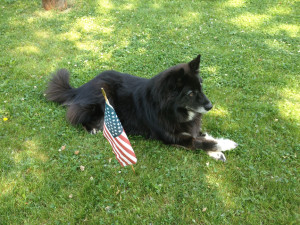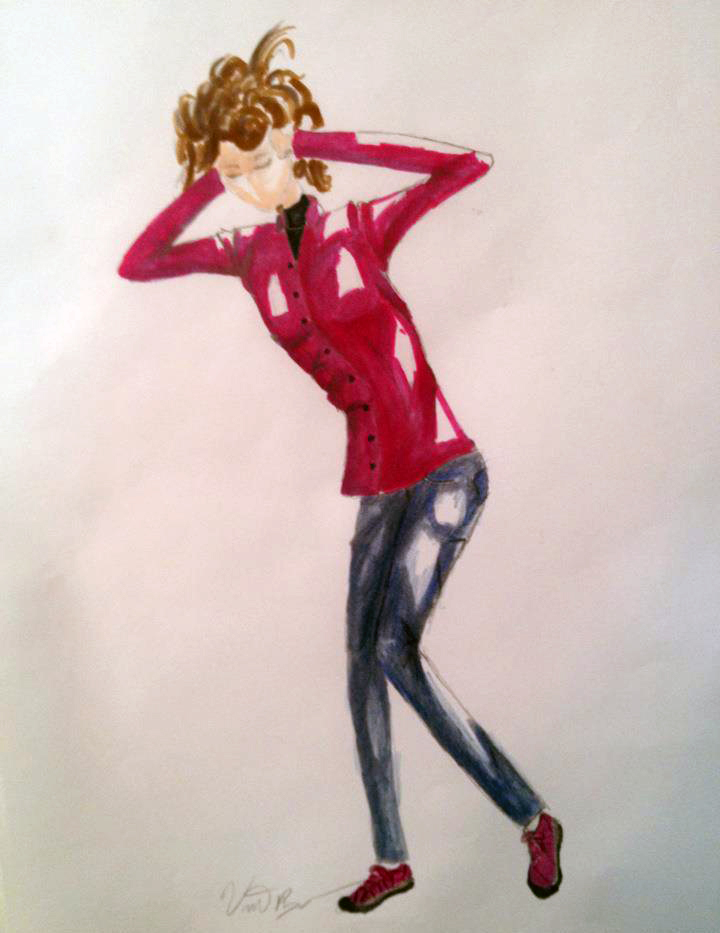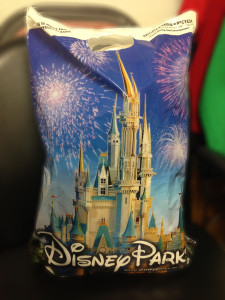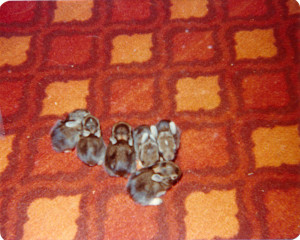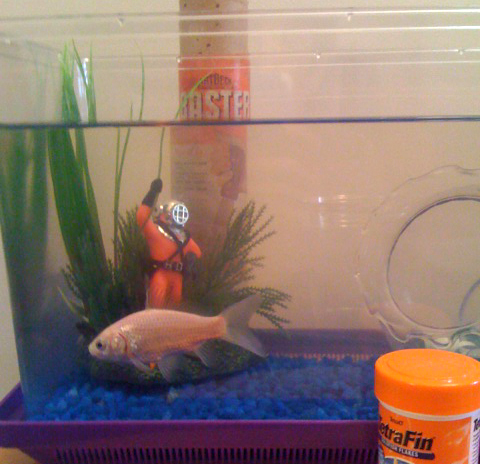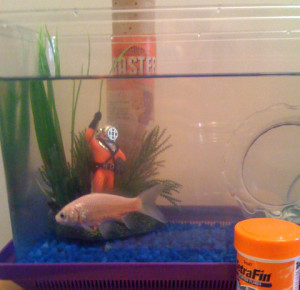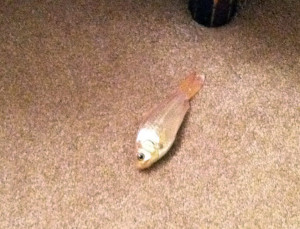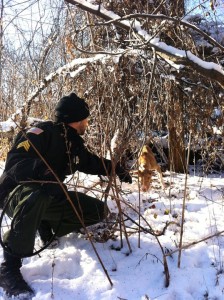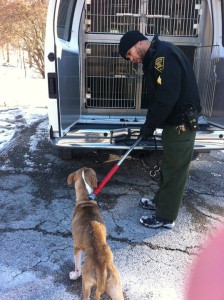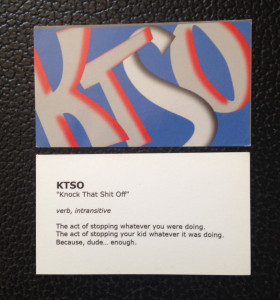Bowie-dog leaps up into the car. I close the hatch and climb behind the wheel.
“I’ll drive,” I tell her.
“I’ll pretend you’re doing a good job.” She crosses her legs.
We head to the bark park. The bark park is a place to run leash-free and sniff anything attractive. The dogs can do the same.
It is a sunny spring afternoon in April. It is, in fact, Good Friday. My wheels crunch the gravel as I pull into the parking lot, and at the far end I can see two sheriffs’ cars parked side by side, window to window, one facing in and one facing out. The cars appear to be whispering. Or mating, like earthworms. The cops could be swapping anything: launch codes, secrets, bodily fluids. It is both intimate and terrifying. A shaved organ-grinder could do this job of patrolling the park for windshields without stickers, but no, there are TWO Oakland County Sheriffs parked here in the cop-car equivalent of a sixty-nine, scanning the lot for the winner of today’s crucifixion. Those aren’t night sticks, they’re hammers.
I am not terribly alarmed by the ménage à cop because I have a park pass, but still I keep an eye out, in the same way a baby seal watches a killer whale. Just because a predator is well-fed does not mean he won’t bite. Just because he can. Or because his hammer slipped.
I have a park pass because I bought a park pass. There are three previous years’ worth of stickers pasted vertically up the left edge of my windshield parading my allegiance. I am a veteran. These are my flags.
I have a park pass, but… But it’s in the glove box. It is red, it is valid, but it is not stuck to anything except a few stray dog hairs.
See, my windshield is cracked. By applying simple logic, I assume I can just temporarily tape this red sticker to the inside of my windshield until I get the windshield replaced. Windshields in Southeast Michigan crack all the time. Driving through gravel-hauling country is not unlike driving through the Gaza Strip. Stoning is common. So is getting hit with rocks. And since the crack is way down below my field of vision, replacing the windshield is on my “Round To It” list. I’ll get around to it. And in the meantime, I’ll tape this (current, paid-for, red) sticker to the cracked windshield.
But logic, as it turns out, is silly of me.
I pull into a parking space well away from the cop cars, (no reason to poke the orca, I figure), and I tape the red sticker to the inside of my windshield at the top of the column of retired flags. (Of course I have cellophane tape. All law-breakers carry office supplies.)
I open my car door, and before I can even walk around to release Bowie-dog, one of the deputies, a female officer, hustles out of her car and hails me. She waves a flipper from 50 feet away and swims towards me.
“Do you have a pass?” She asks, approaching me in big brown horse strides. I was wrong. They’re not flippers, they’re hooves.
“I sure do.” I smile without rancor. I am righteous and in compliance. I’ve got my sticker. I can’t wait to show her. I lift my sunglasses up off my eyes so she can peer deeply into my innocence.
“I didn’t see any sticker,” she says, her mouth a slit of baleen. Obviously she was watching for my red park pass, or as I’m beginning to think of it, my bullfighter’s cape. She leans in and jangles something, possibly her bridle.
“It’s right here.” My eyes narrow, but I keep smiling. I am virtuous. I point to the sticker I just taped to the windshield. The red one. The one that’s valid for this whole year.
“Oh, no. That won’t do,” the officer shakes her head. Her blowhole shudders. “You have to take off the backing and affix it to the inside of your windshield.” She loves this word.
“But look here,” I say, rubbing my finger over the crack, still pretending she’s a rational person. “My windshield is broken and I need to replace it, so I don’t want to permanently affix the sticker.” When in Rome.
“You have to. You have to affix it to the windshield. Those are the rules.” Her tail flicks. A fly buzzes.
“Um, it’s cracked…” I try again and caress the wounded glass in case she missed it the first time. “And if I put the sticker on permanently, and then I get my windshield replaced…” I let the thought trail off, hoping that she at least graduated in the middle of her class.
“No.” She shakes her head and paws the ground with her hoof. Shoe. She’s probably wearing shoes.
She tilts toward me, breathing too hard. “You have to affix it to the inside of the windshield.” She tinks the jagged break with a raptor’s claw. I flinch. “Then when you replace the windshield, just scrape the sticker off with a razor blade and take the handful of slivers with you to the park office, and they’ll give you a new sticker.” She holds her hand in a little cup-shape, offering me an imaginary handful of insane sticker shards.
I look at her now, really look at her. Her hair is pulled back in a severe red ponytail. She’s about my age and about my height, but she’s “been rode hard.” I doubt she was ever “put away wet,” though, since this bitch has not been moist since the 1980s. I am trying hard not to think of her as the B-word, because in fact she’s rapidly moving down the alphabet to the C-word.
I tip my head and lower my voice.
“Does this make sense to you?” I say softly, and I rub my finger over the crack again, showing it tenderness after her late hit. “I paid for the sticker. If I just tape it now, then I don’t have to go through all that scraping. Later. During the abortion.” Okay, I don’t say that last part.
“Those are the rules. That’s what the park wants. For you to affix the sticker to your windshield. Those are the rules.” She again taps the fingers of one hand into the cupped palm of the other where the extruded fragments of a sticker miscarriage will weep. I want to offer her a sugar cube.
I’m thinking that she’s wrong, that’s not what the park wants. What the park wants is for me to buy a sticker. I did that. I’m thinking that she’s victim hunting. I’m thinking that she pees standing up.
I say one more time, very quietly, “And this makes sense to you?”
“Those are the rules.”
I want to tell her that segregation used to be a rule, that shoving Jews into ovens used to be a rule, that cunts like her couldn’t even have her job 30 years ago, because those were the rules. (Oh, she made it big-time to the C-word.) I want to tell this dried-up piece of horse crotch to stop waggling her dick at me, but she is wearing a badge, a nightstick, and a gun, and I am out-numbered by her phallic symbols.
I look down very obviously at her name tag: Officer Sexton.
Of course it is.
I nod, put my sunglasses back down over my eyes, and swallow my venom. I turn back to my car, open the door, peel the backing off the red park pass, and af-fucking-fix it to the inside of my cracked windshield. Officer SexTongue snorts and cantors back to her car, her gait made more difficult by her erection. She greets the other deputy, a pink balding male, with a whinny. They hitch up their belts and share a “We nailed one!!” high-five. I slam the door too loudly which fuels their “Crucify-Him!” fever.
I am sucking air in my car, a raped baby seal. The predators don’t move. If I leave, I look guilty. If I stay, I look guilty.
I came here to walk my dog, dammit, and I’m gonna walk my dog.
I get out and open the hatch where Bowie-dog has been silent during my humiliation by Officer SexTaunt. I briefly wish Bowie were a rabid pit bull to whom I could whisper: “That one. Leave no trace.” But no, Bowie is lovely and even-tempered. Useless.
We walk around the park. Well, she walks and I stomp around trying to burn off the adrenalin. It’s not working. Two or three laps do not even begin to dilute the toxic build-up from recent combat. This outing has been poisoned.
“We have to go,” I tell her, and I head for the gate.
“Already? Why??”
“Because killer whales blow!”
“Your metaphors are inconsistent!!”
“Don’t. Test. Me.”
I leash Bowie and put her back in the car. I have to drive by the killing field in order to escape the park. The cops are still leaning against their vehicles. I remotely wonder whether the Brillo Pads on their hairy ass cheeks ever scratch the paint. Officer SexTaint is awkwardly hand-jiving her fat partner, Deputy Pink-Blubber, an absurd sea horse throwing gang signs at a manatee. And as she lifts her left hand with a gesture straight out of “Vanilla Ice Runs the Derby,” I see the glint of a gold ring.
Just kill me. Officer Secretariat has a husband.
I bet he’s a rodeo clown. When he’s not blowing seals.
We leave. I drive. I am simmering with insults about Clydesdales and sperm whales. Half-way home Bowie says, “Don’t be hating.”
“It’s my birthright.”
Bowie-dog scratches her ear, smug with a secret.
“Did you ever put your new registration sticker on your license plate?”
I whip around at her. “What the hell are you talking about?”
“Aren’t you driving with expired plates? Hasn’t your registration sticker been sitting in your glove box for six months now because ‘it’s cold outside’?”
I laugh. I laugh hard. I may have whinnied. I want to high-five Bowie-dog but she doesn’t have any thumbs.
“I owe you a high-four,” I tell her in the rear-view mirror.
“Giddy up.”
“Yippee-ki-yay…”
And we finish the swear together.
———
18 January 2015, “True Stories in the Key of E-flat”
